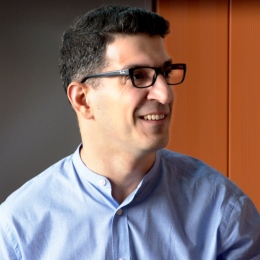Designing Gamified Robot-Enhanced Interventions for Children with Neurodevelopmental Difficulties
September 2021 – September 2023
Objective
Arzu’s future research focus is co-designing and developing gamified robot-enhanced interventions for children and adolescents with neurodevelopmental disorders (NDDs). The research will be based on an iterative design approach to develop interventions for and with the target user groups tailored to the individual to enhance the functional recovery of sensorimotor, social, or cognitive functions in children with NDDs. She aims to investigate what the best roles for robots are in different inclusive practices, including neurodivergent and neurotypical groups where they play and learn together, how to involve children in the design process of robot-mediated activities, and how to design inclusive gamified practices to enhance social interaction between the neurotypical and neurodivergent children as well as their families.
Background
Neurodevelopmental disorders (NDDs) result in different degrees of emotional, physical, social, academic and economic consequences for individuals and in turn, families and society [1, 2]. Upon diagnosis, families report significant delays in treatment initiation and unsatisfactory levels of treatment monitoring. [2, 3].There is a need to establish effective easy-to-access strategies for assessing, treating and monitoring NDD.
Rapid progress in the area of robotics offers excellent chances for innovation in the treatment of children with NDDs, thanks to robots allowing the execution of specific and repetitive tasks which can be tailored according to the particular needs of the individuals. Robots thus offer the opportunity to deliver automated and independent interventions that enable therapy to be delivered over a distance in inclusive and collaborative education environments [4,5] and personalise treatment procedures [6,7]. Combined with gamification, which improves the learning rate and ensures effective improvement in the pedagogical, social and behavioural sense [8,9], robot-enabled therapy becomes a highly promising avenue for research.
About the Digital Futures Postdoc Fellow
Arzu Guneysu Ozgur is a Postdoctoral researcher at Digital Futures. Arzu got a PhD in Robotics on “Designing Gamified Activities with Haptic-Enabled Tangible Robots for Therapy and Assistance” from EPFL in 2021. Her research interests include various topics in Human-Robot Interaction, Adaptive Robot-Enhanced Therapy, Iterative Design, Participatory Design, Neurodevelopmental Disorders, Gamified Therapeutic Technologies, Healthy Aging, Intergenerational Practices for Elderly and Children, and Special Education.
Main supervisor
Iolanda Leite, Associate professor, Department of Robotics, Perception and Learning, KTH
Co-supervisor
Ali Reza Majlesi, Associate Professor, Department of Education, Stockholm University
Watch the recorded presentation at Digitalize in Stockholm 2022 event:
Contacts

Arzu Güneysu Özgür
Former Digital Futures Postdoctoral Fellow, Postdoc project: Designing Gamified Robot-Enhanced Interventions for Children with Neurodevelopmental Disorders
arzuo@kth.se
Iolanda Leite
Associate Professor, Department of Robotics, Perception and Learning at KTH, Working group Learn, PI: Advanced Adaptive Intelligent Systems (AAIS), Former Main supervisor: On The Feminist Design of Social Robots and Designing Robots For Young People, With Young People, Former Main supervisor: Designing Gamified Robot-Enhanced Interventions for Children with Neurodevelopmental Disorders, Digital Futures Faculty
iolanda@kth.se
Ali Reza Majlesi
Associate Professor at SU, Co-PI: Empowering Cultural Integration and Language Learning through Conversational AI, Former Co-supervisor: Designing Gamified Robot-Enhanced Interventions for Children with Neurodevelopmental Disorders at Digital Futures, Digital Futures Faculty
08-16 37 66ali.reza.majlesi@edu.su.se


